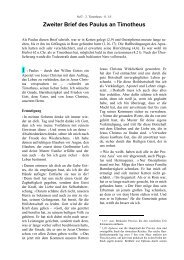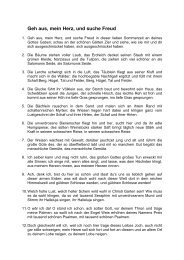You also want an ePaper? Increase the reach of your titles
YUMPU automatically turns print PDFs into web optimized ePapers that Google loves.
– a distorted image<br />
evolutionary thought. It concerns the difficulties<br />
of human birth. Josef H. Reichholf discusses this<br />
in an article “Difficult birth for humans – easy in<br />
the case of animals” (in the German magazine<br />
Natur, July 1989, p 57 - 59). He describes the<br />
birth process in the case of some mammals<br />
under the heading “Privilege of the animals: Birth<br />
without pain”.<br />
1 Giraffe: “The newborn calf falls from a height<br />
of more than two metres. But the entire birth<br />
proceeds with very little drama, in relaxed and<br />
tranquil fashion.”<br />
2 Gnu: “The heavily pregnant cow moves along<br />
with the herd, only drawing apart just before giving<br />
birth to a large, well-developed calf, without<br />
haste or complaint. She licks the calf dry, massages<br />
him, and helps the gangly newborn gnu<br />
onto his feet as necessary. From then on, he can<br />
manage on his own. The actual birth takes only a<br />
few minutes, but even this can be too long should<br />
danger threaten. Then the cow simply interrupts<br />
the birth process and runs along, with the calf<br />
already protruding, until it can emerge in safety.”<br />
3 Seals: “On the other side of the earth, the normally<br />
slender female seals, their bodies now distended,<br />
waddle clumsily over the lava rocks onto<br />
the beaches of the Galápagos islands. There, during<br />
the weeks before Christmas, they await the<br />
birth of their pups. Seals also give birth rapidly,<br />
which might be expected in view of the ease with<br />
which the streamlined body of the newborn overcomes<br />
the narrowness of the birth canal. The<br />
process is smooth and precise; only a matter of a<br />
few seconds, involving neither pain nor difficulty.”<br />
After considering other animals as well, Reichholf<br />
concludes: “Wherever we observe the birth of<br />
mammals, it seems to be relatively effortless and<br />
appropriate to their way of life.” Then he comes<br />
to human beings:<br />
“Only man doesn’t fit this pattern. Usually only<br />
one baby is born, and it involves a lot of pain.<br />
And worse still – without assistance, the motherto-be<br />
is practically helpless, especially if it is her<br />
first child.” Then Reichholf again asks the question<br />
as to the “why” of the difficulty of human<br />
birth. He answers as follows:<br />
“Why is it so hard for humans, of all creatures, to<br />
come into the world? This end-product of evolution<br />
regards itself as the crown of creation. Yet<br />
one has the impression that something must<br />
have gone wrong, something important, during<br />
man’s descent. This is the logical conclusion from<br />
comparison to the other higher mammals.”<br />
Reichholf’s observations are perfectly correct, but<br />
his conclusion is erroneous. Nature never<br />
explains itself. We thus require an external source<br />
of information. And the moral of the above is:<br />
Without the Bible, we are left to grope in the<br />
dark as far as most aspects of life are concerned.<br />
No biologist or gynaecologist can really explain<br />
why human childbirth is so difficult and painful.<br />
It is a direct consequence of man’s sin. In the<br />
original creation painless birth was provided. But<br />
after they had sinned, God told Eve: “I will greatly<br />
increase your pains in childbearing; with pain<br />
you will give birth to children” (Gen 3:16).<br />
The real damage caused by the theory of evolution<br />
is not so much that, seen through those<br />
glasses, many facts concerning life and nature<br />
cannot be explained satisfactorily. The real harm<br />
is that it is associated with a rejection or distortion<br />
of the Bible. Paul’s assertion that he believes<br />
everything that is written (Acts 24:14), is also<br />
very important for us, as will become clear in<br />
subsequent chapters where the question of our<br />
salvation is discussed.<br />
113
















